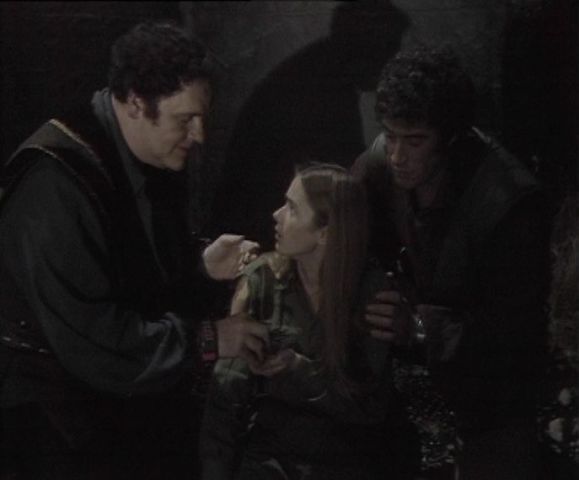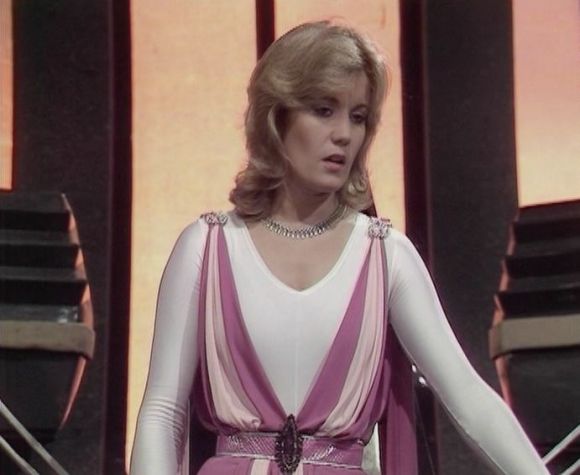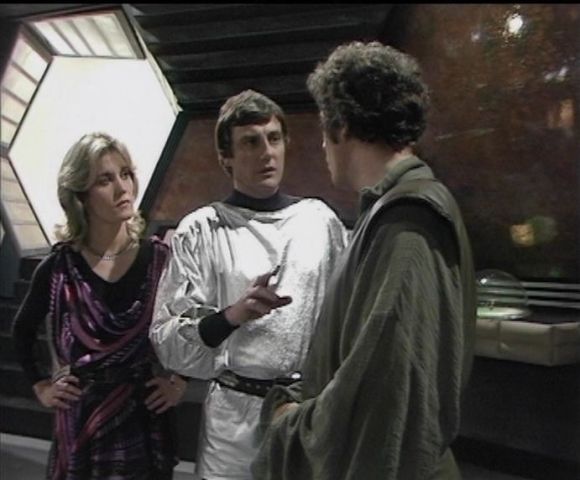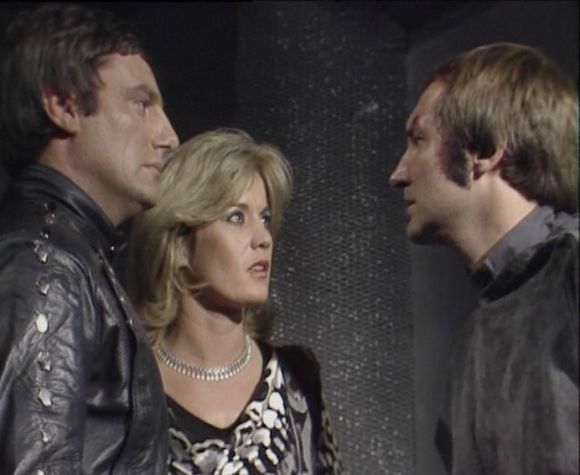Whilst the initial reason for scripting Pressure Point was borne out of necessity (Gan had to be written out) in the end it proved to be something of a watershed for the show. Since the start of series one we’ve seen that Blake is a far from infallible character – he may have positive qualities which mark him out as a natural leader but his decision making can often be deeply flawed.
This is shown most brutally in this episode. Blake has returned the Liberator to Earth – to howls of protest from everybody except Cally. She, like Blake, is a fanatic. They value their own personal safety far less than the cause they’re fighting for – you know that either would be only too willing to sacrifice their life and become a martyr. But Avon, Jenna and Vila don’t share their burning intensity – they might be happy to ally themselves to Blake, but personal preservation is never far from their minds.
And what of Gan? We can say for certain that he’s always been (with the odd exception, such as Shadow) one of Blake’s most staunchest allies. But it’s possible to consider that his frequent shows of support for were designed mainly to allow Avon to score cheap points at their expense. Blake would announce a risky scheme, Gan would give him his whole-hearted support, Avon would roll his eyes and mutter something disparaging along the lines that only someone as stupid as Gan could ever think it was a good idea.
Blake tells the others the reason for returning to Earth. “Two hundred years ago, when the Federation began expansion and conquest, the Administration established a computer complex to monitor information: political, civil, military – everything. That computer is the nerve center of ALL Federation activity. Smashing that would be the biggest single step toward the destruction of their power. I don’t think they would ever recover from it.”
This seems not dissimilar to the space control complex on Saurian Major as seen in Time Squad. That was also seen by Blake as a vital part of the Federation’s empire – although after he destroyed it there seemed to be no change at all to the smooth running of the Federation.
Coming fresh to Pressure Point, and especially if you’re aware of Terry Nation’s history as a writer, it would be reasonable to assume that Control on Earth would be similar to the space control complex on Saurian Major – just a MacGuffin which exists for the sole purpose of giving the Liberator crew something to attack. They teleport down, shoot some guards, lay some explosive charges and teleport back up – job done.
But this doesn’t happen. Control is an empty shell designed to lure people like Blake into a trap and the moment of revelation is a stunning one. Blake falls to his knees, speechless, whilst Travis explains. “You see, it’s the great illusion, Blake. You give substance and credibility to an empty room, and the real thing becomes undetectable, virtually invisible.”
The only thing worse than Blake having risked all their lives for nothing is that Gan dies as they make their escape. And it’s the complete pointlessness of his death which is striking . Nation could have scripted a story where Gan dies a heroic death – saving Blake and the others – instead the last shot we see of his lifeless body is deliberately anti-heroic.
It’s a far cry from, say, Planet of the Daleks (a 1973 Nation-scripted Doctor Who adventure). In that story we see various Thals die during the course of the six episodes and each time the Doctor is on hand to deliver a short moral homily. The Doctor’s speeches were intended to demonstrate that the Thals didn’t die in vain – they were sacrificing themselves for the greater good. No such comfort can be drawn from Pressure Point though. Gan did die in vain – there’s no two ways about it.
Although George Spenton-Foster (something of a bogey-man for Brian Croucher) directed this one, Croucher does seem more settled as Travis. There’s far less of the histrionics we saw in Shadow and a touch more of the calculating Travis of old. Possibly this is because he’s convinced that the plan to capture Blake is such a good one.
The focus is slightly more on Servalan though, thanks to her interaction with Kasabi (Jane Sherwin). Kasabi is the rebel leader who Blake intends to contact – without her help he won’t be able to breach the outer defences. Servalan and Travis capture her, but she proves uncooperative. Kasabi’s previous relationship with Servalan helps to shine something of a light on the Supreme Commander. “Don’t try and browbeat me Servalan. Or have you forgotten that I knew you as a cadet? You were a credit to your background: spoilt, idle, vicious. My confidential assessment listed her as unfit for command. But I forgot how well-connected she was.”
As Kasabi doesn’t survive the interrogation it’s lucky that Servalan and Travis have an alternative – Kasabi’s daughter Veron (Yolande Palfrey). This was a fairly early credit for Palfrey (who died far too young in 2011) and she’s not always entirely convincing (although we could be charitable and say this is because she was feeling the pressure of being a traitor to the cause).
It’s notable that when Blake and the others find her it’s Gan who’s the most solicitous. This may be a decision from Nation to bulk up his part (too little, too late if so) or it could be a nod back to Project Avalon which saw Gan rather taken with the android Avalon. Poor Gan, never a good judge of females (real or manufactured) it would seem.
I do have to mention Jacqueline Pearce’s dress (as seen in the first picture). Not very practical, but it’s certainly memorable.
Another point of interest is an exchange between Blake and Avon before they launch the attack. Avon rather surprises Blake by giving him his full support, but Avon being Avon there’s a reason behind it. “If we succeed, if we destroy Control, the Federation will be at its weakest. It will be more vulnerable than it has been for centuries. The revolt in the Outer Worlds will grow. The resistance movements on Earth will launch an all-out attack to destroy the Federation. They will need unifying. They will need a leader. YOU will be the natural choice.”
With Blake unifying the resistance, Avon will take over the Liberator. As we’ll see, this is something that will ultimately come to pass …..
But not for a little while as Blake’s defeat here will only intensify his desire to find the true location of Control. This will form a loose running thread which will carry on until the the conclusion of series two – Star One.







































